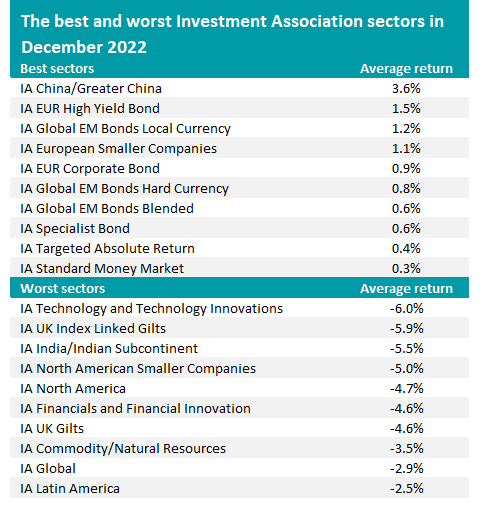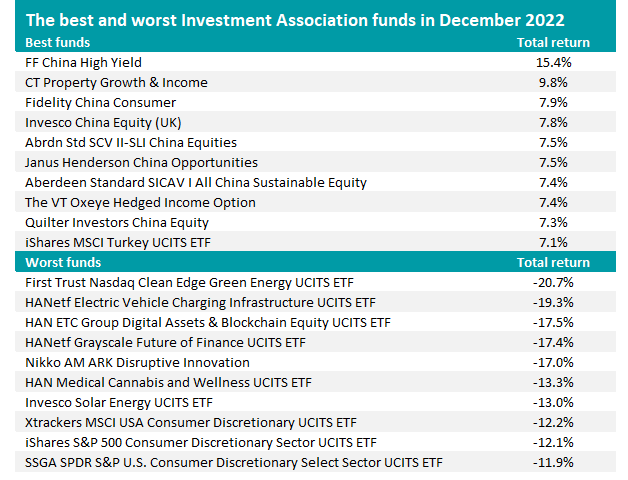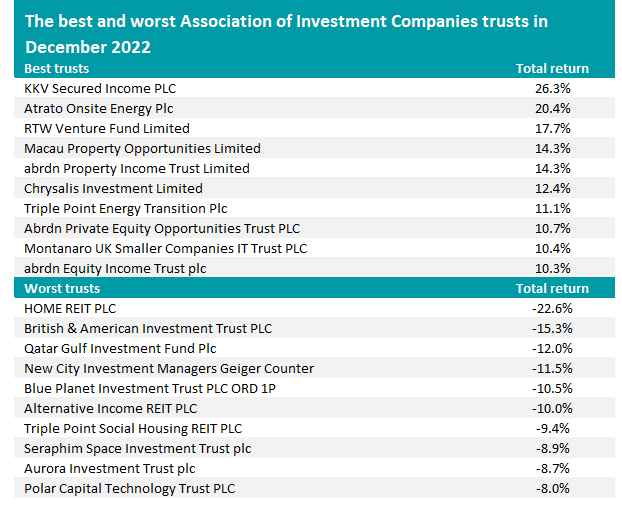December was another downbeat month for investors with most funds posting losses as worries about high inflation and the health of the global economy persisted, FE fundinfo data shows. 
While there are signs that inflation is peaking in both the UK and the US, investors continue to worry about the need for higher interest rates and whether this will pull the economy into recession.
Risk assets staged something of a rally in November but this wasn’t sustained in December after central banks warned that interest rates would keep rising for the foreseeable future.
Russ Mould, investment director at AJ Bell, said: “So much for the Santa rally, as it failed to deliver in December, when the FTSE 100 fell by 1.6%, the Stoxx Europe 600 lost 3.5% of its value and America’s S&P 500 slid by 6%.”
This meant that just 12 of the Investment Association’s 57 fund sectors made a positive return in December, led by the 3.6% total return from the average member of the IA China/Greater China sector.
Chinese equities continued their bounce from the country ending its zero-Covid policy in November. Although this appears to have caused another Covid wave to hit China, it should offer a boost to the world’s second largest economy when activity eventually returns to normal.

Source: FE Analytics
Tech funds made the month’s worst returns, reflected their sharp downturn across 2022 as a whole. Growth stocks – which includes many tech names – tend to underperform when interest rates are rising and last month saw the Federal Reserve remind markets that interest rates will continue to rise.
When it comes to individual funds, the list of December’s best performers in dominated by those that invest in China as this was one of the few good news stories of the month for investors. FF China High Yield led the way – it’s 15.4% total return was the only double-digit gain of the month.

Source: FE Analytics
Double-digit losses were much more common, however, as stocks sensitive to higher interest rates tanked. In addition to tech, these include green energy stocks as their renewable projects tend to be financed by debt and consumer discretionary names as people spent less on luxuries when money gets tighter.
Turning to investment trusts, IT China/Greater China was the best performer after its average member was up 6% followed by IT Debt - Direct Lending (4.7%) and IT Asia Pacific Smaller Companies (4.2%).
IT North America was hit by the month’s biggest loss (the average trust here was down 4.9%), with IT North American Smaller Companies and IT Environmental down 4.4% and 3.7% respectively.

Source: FE Analytics
December’s best performing trust was KKV Secured Income. It specialises in alternative finance investments but entered into a managed wind-down in September 2020 and is being managed with the aim of realising all remaining assets in the portfolio.
Many of the other top 10 trusts last month are niche offerings but more recognisable names include abrdn Property Income Trust, Chrysalis Investment and abrdn Equity Income Trust.
HOME REIT fell the most, dropping 22.6% in December. The trust was the subject of a short seller’s report that raised questions about a range of issues, including the valuation of the REIT's properties and the ability of its tenants to pay rent; HOME REIT dismissed the claims in a statement issued in November.
However, the shares in the trust were temporarily suspended from trading yesterday after it missed a deadline to publish its annual financial report.





